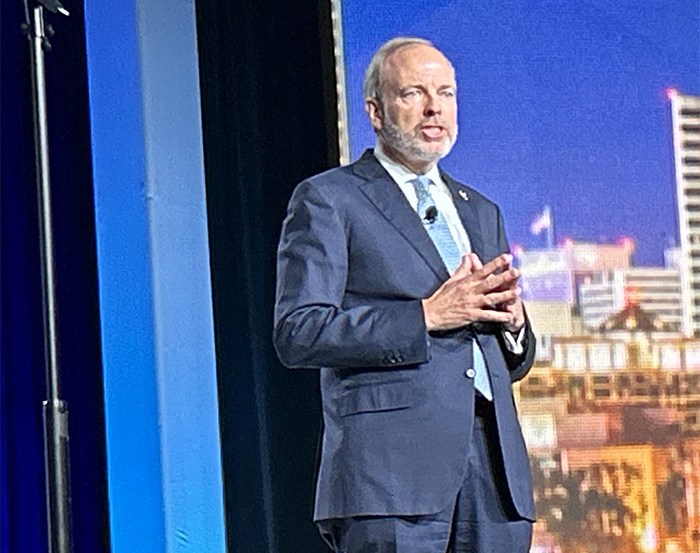
MBA CEO Bob Broeksmit at #MBACREF24: Industry Participation Vital to Overcoming Policy Challenges

(Bob Broeksmit on stage at CREF24, Image by Anneliese Mahoney)
SAN DIEGO–MBA President and CEO Bob Broeksmit, CMB, highlighted challenges to the commercial real estate finance industry–from Basel III to affordability–here at the MBA Commercial/Multifamily Finance Convention and Expo.
But, Broeksmit noted, MBA is working to fight those battles every step of the way, and industry collaboration will be paramount in those efforts.
“During the pandemic, your companies moved heaven and earth to keep the economy afloat,” Broeksmit said. “Yet instead of thanking you, lawmakers and regulators are holding you back and making it harder for you to help Americans move forward.”
One worry is the proposed Basel III capital requirements, which Broeksmit warned “could be the end of bank real estate finance as we know it” and will “stifle lending.”
Among other issues and criticisms, the proposal isn’t backed by sound research, Broeksmit said.
And, it would create a new system for defaulted commercial real estate loans–if one loan goes bad, regulators want to assign a 150% risk weight to all of that borrower’s loans. That’s an overly simplistic view, Broeksmit said, noting that each commercial transaction is separate and distinct.
“Make no mistake, this mandate will chill bank lending,” Broeksmit said. “A tiny number of bad loans could drag down a much larger number of healthy loans.”
The reaction from the industry has been striking, Broeksmit said. Of 356 comment letters submitted on the proposal, 97% were negative.
Basel III has even made it out of the industry and into the mainstream conversation. Broeksmit held up his reading material from his flight to San Diego–an issue of the Wall Street Journal featuring a full-page ad arguing against the Basel III proposal.
“Banking capital rules are supposed to be boring and proceed with complete unanimity,” Broeksmit said, highlighting the irregularity of the current day.
But Basel III is far from the only issue concerning the industry. The fight against rent control is top of mind, Broeksmit said. While it’s often advocated for under the argument of tenants’ rights, “rent control leads to lower quality of rental properties, and fewer properties, too,” he continued. Per MBA estimates, if rent control was required by Freddie Mac and Fannie Mae, it would halve multifamily financing in the U.S.
“The good news is that rents have stabilized after pandemic-driven increases,” Broeksmit said. “We want to keep up the progress, which is why we support expanding the supply of housing. Zoning and permitting reform are the real answer to rent increases.”
Also on the subject of affordable housing, Broeksmit noted that while the Federal Housing Administration has made progress on some issues–such as increasing the large loan limit threshold and removing the Low-Income Housing Tax Credit cap–it needs to do more.
Broeksmit called on the Department of Housing and Urban Development to follow through on increasing wind/named storm insurance deductible from 1%. HUD had announced it would change that policy at the 2023 CREF conference, but as of yet, no progress has been made.
HUD also needs to crack down on unnecessary and duplicative fees, Broeksmit said. Plus, it’s time to reexamine the mortgage insurance premium, he said, with evidence pointing to premium rates far outweighing risks.
These are complicated issues, Broeksmit said, and “FHA and HUD need the administration to take off the brakes, so we can finally move affordable housing into high gear.”
It’s not all about playing defense–there are also opportunities to fight for good policies. The House of Representatives recently passed a bipartisan bill that increases the Low-Income Housing Tax Credit, an issue MBA has advocated for strongly.
Getting that bill through the Senate is a topic on which MBA is urging industry participation, Broeksmit said, encouraging all to join the Mortgage Action Alliance, a free advocacy network.
There are other opportunities to get involved in such efforts, Broeksmit noted, highlighting MORPAC–MBA’s voluntary, bipartisan political action committee–and the upcoming MBA National Advocacy Conference, to be held March 19-20 in Washington.
“In this time of policy threats and widespread inaction, we need your help,” Broeksmit said. “MBA is a constant buzz in policymakers’ ears, letting them know what’s helpful and harmful,” he said. “But every now and then lawmakers need to hear a louder voice. And that’s all of you.”
